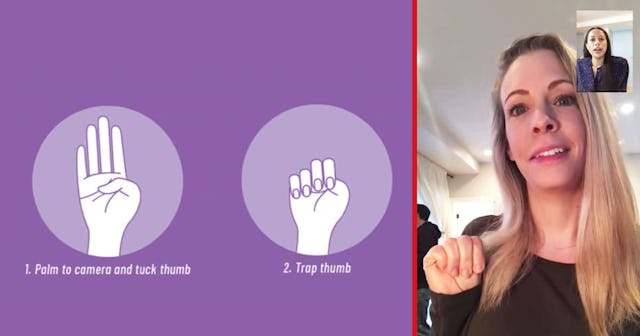The 'Signal For Help' Could Save Someone's Life From Domestic Violence

Learn this secret hand signal, and you could help save a life from domestic violence
With the COVID-19 pandemic, people have been spending a lot more time at home. Many are now working from home, and with places like bars, restaurants, and movie theaters just beginning to open up, there haven’t been many places for people to even go. As countries emerge from their quarantine periods, we’re seeing increased divorce rates in some. And the other horrifying side effect of all the time spent at home is an increase in domestic violence reports in many places too.
The Canadian Women’s Foundation wants to help combat that. They’ve created a resource page specifically to address the dangerous new challenges women face because of social isolation in quarantine. And while some of the resources are Canada-specific, there are others that we can all get behind — like a secret hand signal women can use in a Zoom or FaceTime call if they need to ask for help — because of domestic violence or any other reason they feel unsafe.
The “signal for help” is a one-handed gesture that can be done silently to show that you need help. All you do is raise one hand, palm facing the camera, tuck in your thumb, and then wrap your fingers around your thumb to make a raised fist. If you’re facing domestic violence at home, this might help keep you safe. And if you see anyone else giving the signal, you can help get them to safety. But first, the message needs to be spread.
https://www.instagram.com/p/CBUxcQmHR-E/?igshid=1k5go1hjoy6vl
“There’s ample evidence that disaster situations can lead to a surge in gender-based violence. Public health directives on home isolation might increase danger and risk for people in abusive relationships,” the Canadian Women’s Foundation writes, but it also notes, “The Signal for Help is a tool that may help some people, some of the time. Some people do not have the ability to make video calls.”
The Foundation also gives some advice for what people can do if they see someone using the signal. There are ways you can check in with someone safely, like by calling them and asking “yes” or “no” questions (in case someone is listening), or by asking open, general questions like “How are you doing?” or “How can I help you out?”
The website does warn that if someone is in immediate danger, from domestic violence or anything else, you should call 911 right away.